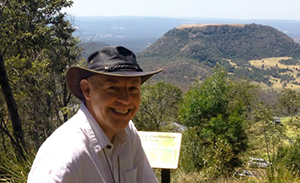ABM Archive Website
THIS WEBSITE CONTAINS ARCHIVE MATERIALS FOR HISTORICAL REFERENCE ONLY
For up-to-date information, including our latest appeals, news, and resources, please visit our current website.
Faith in a climate change age
December 2016
 |
| The Revd Dr Jo Inkpin. Used with permission, 2016 |
One of my most moving experiences was visiting an Indigenous tribe in the Philippines. On the surface the people lived extremely simple lives of basic material subsistence. Yet the richness of their connection to their environment was profound. They not only lived in their river and valley. They were their river and valley. For like traditional Indigenous peoples globally, they related intimately and instinctively to every feature and changing aspect. Tragically, that sacred relationship was shattered irrevocably when the tribe was forcibly removed to make way for a powerful dam. It was another development in what we moderns call ‘progress’. Yet it was a backward step in both human dignity and ecological awareness. For such peoples are not only potential victims and partners in our global economy. They are also potential pointers and partners to our own sustainability and shared wellbeing. Like the proverbial canaries in a mine, we ignore them, their wisdom and need for justice, at our peril.
When Pope John Paul II spoke of the need for ‘ecological conversion’, he articulated a similar core issue at the heart of contemporary environmental challenges. For this does not primarily consist in a lack of information or technological capacity. We badly need these things too, not least continued informed climate and environmental science, and urgent appropriate development which is sensitive to people and context. Yet without a shift in essential perspective we will fail ourselves, the poor and the planet. Climate change deniers will continue to be influential and even elected to the highest offices. Exhausting and uneven international processes and short-term technological fixes will still be the order of the day. Instead, as Pope Francis outlined in Laudato Si, ‘the basic problem goes much deeper: it is the way that humanity has taken up technology and its development according to an undifferentiated and one-dimensional paradigm. This paradigm exalts the concept of a subject who, using logical and rational procedures, progressively approaches and gains control over an external object… Human beings and material objects no longer extend a friendly hand to one another; the relationship has become confrontational.’ In other words, we have dethroned the sacred and separated humanity from God’s web of life to which we are inextricably connected. We thus need to re-read our relationship with one another and our whole environment, with the ecological eyes and ears of God. The search for climate justice is profoundly a spiritual and theological question. Who and what do we privilege?
Rich veins of eco-theology and spirituality now exist across the ecumenical and inter-faith spectrum, yet they lie largely unmined and utilised. Scripturally speaking, for instance, the ‘Great Commission’ of Matthew’s Gospel often obscures the first biblical commandment, of Genesis 1, to care for all of Creation. The work of Jesus is still typically related primarily, or exclusively, to human ‘spiritual’ salvation. Many ecclesiastical concerns focus on growth in human numbers rather than sustainable growth of communities in their full ecological context. So it will not do to continue church as usual. Faith, hope, and love in an age of climate change require us to engage in ‘ecological conversion’: re-reading our scripture, tradition and ways of prayer with ecological eyes; and, crucially, acting accordingly. In this, we urgently need to recognise the gifts, as well as the plight, of the poor.
As extreme weather events become more commonplace in the wealthy world, more empathy might be created towards those who bear the greatest brunt of destructive environmental change. Australians Christians should have no excuse, as the voices of our poorer sisters and brothers, not least in the Pacific, have been crying out in this way for decades. Yet we need to hear the wisdom of God speaking through them too. This is part of the world’s ‘Indigenous Gift’. It is the work of the Holy Spirit, calling us, through the world’s ‘groanings’, as St Paul put it, into God’s new creation. For, as the great prophet of ecological ethics, Father Thomas Berry, continually observed: the universe is a communion of subjects, not a collection of objects, and if we do not understand that we will not understand anything.
The Revd Dr Jo Inkpin
The Revd Dr Jo Inkpin is a lecturer at St Francis Theological College in Brisbane, and a former ecumenical officer for the National Council of Churches in Australia, engaged in theological reflection and action on questions of peace, justice, reconciliation and the integrity of creation.


